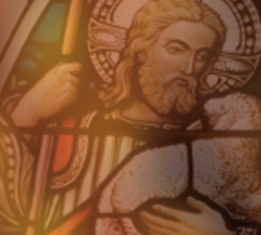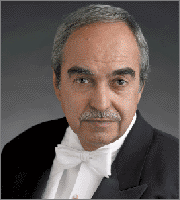
"Messiah" with Meaning
Forget the snow and ice outdoors. For a moment,
it felt like May Sunday afternoon at Music Hall in Cincinnati.

But those were Christmas trees on the stage, not spring bouquets, and the occasion to stand for “Hallelujah” from “Messiah” was a complete performance of the ageless work, not the traditional encore to the annual May Festival.
It felt even more meaningful in the context of the complete “Messiah,” which drew a very large crowd to the hall, one that would have done honor to the ever popular May Festival itself (guesstimate, 2,650).
Led by May Festival director of choruses Robert
Porco, the one-time-only performance featured the 63-voice May Festival Chamber
Choir, a chamber orchestra of Cincinnati Symphony Orchestra musicians (34) and four fine young soloists, soprano
Elisabeth Marshall, mezzo-soprano Laura Thoreson, tenor Daniel Anderson and
bass Mark Diamond.

While not exactly a ”historically informed performance” – what would that be, considering the many ways “Messiah” has been performed in its 268-year history? – it was one with deep meaning and conviction. It worked in Music Hall’s cavernous space, especially with the orchestra and soloists placed completely in front of the proscenium on the lip of the stage and the chorus in a shallow semi-circle just inside the proscenium, with the hall’s acoustical towers aligned behind them.
Porco, soft-spoken architect of the May Festival Chorus for 20 years, led with authority. He is a master of uniting text with music, not only in the interest of clarity but conviction. Rarely, to my ears, has the biblical text chosen by Handel to tell the story of Jesus’ birth, death and resurrection been told with such expression. You could almost feel sparkles of light when the violins introduced “And lo the angel of the Lord came upon them” and the lightness in the choristers voices as they sang “Glory to God in the highest, with CSO trumpeters Robert Sullivan and Steven Pride commenting from the left balcony like a pair of archangels.
Porco favored brisk tempos and crisp articulation, drawing a vivid performance from both vocalists and instrumentalists alike. With just 28 strings, there was no attempt to stifle vibrato for its own sake and it was employed at will, or as the particular moment seemed to suggest.
Soprano Marshall, a doctoral candidate at Indiana University School of Music, possesses an admirably flexible, gilt-edged voice, which she utilized tellingly in “Rejoice” and “I know that my Redeemer liveth.” Mezzo Thoreson, an IU graduate, boasts a rich, creamy tone. Porco set it off beautifully in “Behold, a Virgin shall conceive,” where he was extra-solicitous of bass support by the orchestra. It took on a keen edge in “He was despised.”
Tenor Anderson, a graduate of the University of Cincinnati College-Conservatory of Music, left nothing to be desired in his important role in the oratorio, sounding the opening “Comfort Ye” with tenderness. Bass Diamond, a student of William McGraw at CCM, pumped excitement into “Why do the nationals rage?” and joined with trumpeter Sullivan in a stirring “The trumpet shall sound.”
Sullivan was, in fact, one of the stars of the show, adding gleaming ad lib figures to his lines, both in “The trumpet shall sound” and the final “Worthy is the Lamb.”
The May Festival Chamber Choir brought the text of “Messiah” both down to earth and up to heaven. Moments of excellence (too numerous to mention) included:
“Behold the Lamb of God,” introducing the Passion section, was stark, measured and sobering. “Surely, He hath borne our griefs” took one’s breath away with its emphasis, even downright anger, and the set of choruses that followed it were absolutely compelling. Coloratura was precise by the entire chorus in “All we like sheep have gone astray,” where the vision of a flock of sheep wandering in all directions came vividly to life. “We have turned every one to his own way” saw the sections of the choir emerge by turns, as if facing different directions, and the texture grew heavier by degrees on “The Lord hath laid on Him the iniquity of us all.” There was a kind of chatter effect to the mocking “He trusted in God that He would deliver Him,” followed by tenor Anderson’s plaintive, “Thy rebuke hath broken His heart” and “Behold and see if there be any sorrow like unto His sorrow.”
This word painting continued in “Lift up your heads all ye gates,” where the chorus grew more and more insistent on “Who is this King of Glory?” echoing the answer with assured repetitions of “The Lord of Hosts, He is the King of Glory.”
“Worthy is the Lamb,” the great closing chorus of “Messiah,” was calibrated so that there was a gradual crescendo on “Blessing and honor, glory and power be unto Him,” leading to the most shiver-inducing harmonic suspension in music history on “Amen” and its rock-solid resolution on the final major chord.
Special recognition is due harpsichordist Heather MacPhail, cellist Ilya Finkelshtyn and bassist Owen Lee who performed the “continuo” part (the bass line and fundamental harmonies) eloquently and literally without a break, throughout the oratorio.
One hopes that May will come to Music Hall in
December, 201l and in future seasons as well.